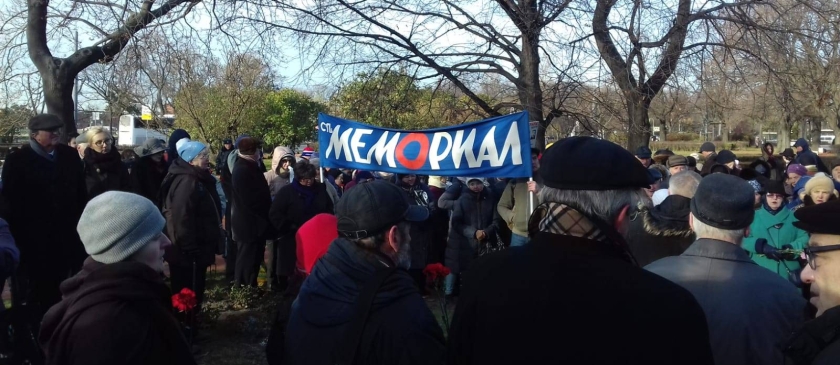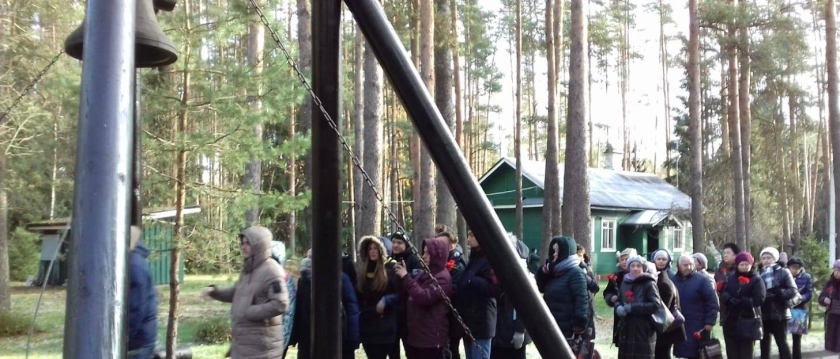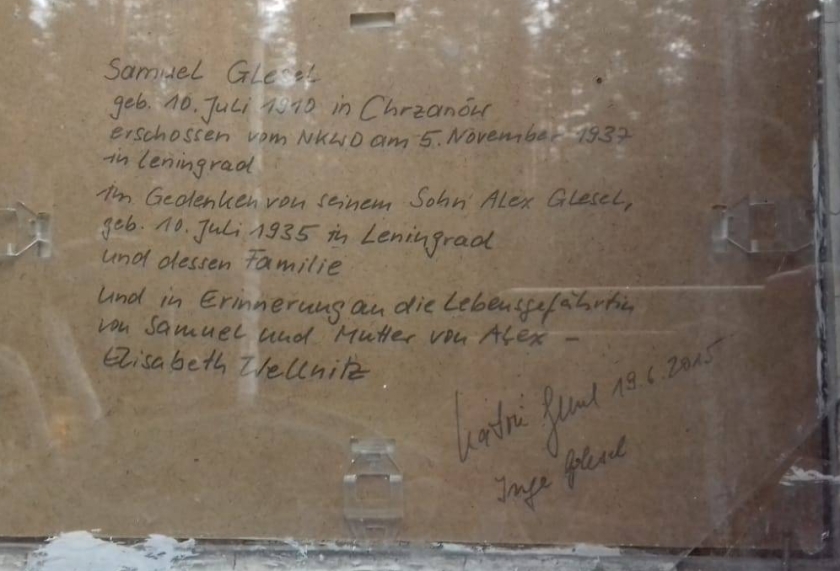
The 30th of October is the „Day of Remembrance of the Victims of Political Repressions“. Many rallies in many different Russian cities take place on this day. Usually, people read out loud the names of those deported and murdered in the Stalinist era.
The rally in Saint Petersburg started at 11.00 a.m. 200 people, most of them elderly, came together at the Solovetsky Stone on Troytsky square. It was cold, some degrees below zero. Was it only the wish to remember the people killed in the 1930s that made all those pensioners defy the cold?
People were holding a banner of „Memorial Saint Petersburg“, one of the most prestigious NGOs in the post-soviet space. Since the 1980s, its activists try to uncover the crimes of the Stalin Era. Furthermore, they try to uncover crimes committed in the two Chechnyan Wars and, in some parts of Russia, also work as a human rights defense organisation.
This memorial banner can be considered as an act of political defiance, as the Saint Petersburg section of Memorial has been registered as a foreign agent since 2015. That means the state practically paralyzed it. Since then, its structures were moved to another organisation.
In other words, the organisers of the meeting do not only deal with the past; they are in midst of present-day political conflicts. Hence, it was not surprising that nobody among the speakers shied away from referring to present-day Russian politics. I recorded the final speech given by a Memorial activist.
„Nowadays, they implement new political repressions in our city and in our country. They prosecute those that tell the truth about Stalin‘s crimes. This is why the monstrous case against Yuri Dmitriev exists. This why the monstrous case against Oyub Titiev exists.“
Yuri Dmitriev and Oyub Titiev both are Memorial activists. Dmitriev worked mainly in Karelia, the region north from Saint Petersburg. The region where political prisoners built the White-Sea-Channel under Stalin. There was a huge network of forced labor camps.
In this region, Dmitriev found an extraordinarily high number of anonymous graves of prisoners that were shot or died from exhaustion.
Since December 2016, Dmitriev is under arrest. Allegedly, he possessed child pornography, pictures of his adoptive daughter. Liberal activists in the provincial consider the trial as politically motivated. They question the judiciary’s independence, many are scared by it. In September, the head of the historical Museum of Medveshegorsk explicitly said: „I am afraid of Dmitriev‘s fate.“
Oyub Titiev, 61, runs Memorial‘s office in Chechnya. By profession, he worked as sports teacher in his chechnyan home village, he founded a children‘s sports club.
Before Titiev‘s arrest in January 2018, Memorial contributed reporting on the dozens of LGBT people that were detained, tortured and often killed in what is considered as state campaign for „sexual cleanness“. (link to a New York Times report on the topic)
The Chechnyan section of Memorial regularly reports on tortures applied by Chechnyan security forces.
Thereafter, Titiev was arrested when drugs were found in his car. Right now, the case is in court. He is likely to face many years in prison. Titiev‘s lawyers argue that the case is fabricated. As Ramzan Kadyrov, the head of the Chechnyan Republic, has Titiev publicly called a „drug addict“, the process against Titiev will hardly be fair. The newspaper „Novaya Gazeta“ has published evidence on how the executive power in Chechnya puts courts under pressure.
After referring to his fellow activists, the speaker talked about other cases of the violation of the rule of law in present-day Russia:
„We see what happens today in our city. We see that People are arrested through false accusations. We see how the case against „Network“ and „New Dignity“ is fabricated by the FSB. Luckily, two extraordinary women, Yana Teplitskaya and Katya Kasarevskaya reported what happened [see my last blogpost].
Society is almost silent about this. In a normal country, not only the director of the FSB, perhaps even the country‘s president would need to resign as a consequence of this. For we know about fabricated evidence, torture and extreme physical violence behind the walls of the successors of our most infamous security organs. In our country, however, this does not happen. Nobody resigns.
Here, people are arrested for meeting other people that used to be under administrative arrest. Here, people are arrested because anything is found in their bags. People are arrested for theatrical performances.
Detained people are kept in torture-like circumstances as I have seen them myself many times. We are forced to run around police officers after public actions. I myself saw the head of a police section who was asked to stop what was indeed torture. With a smile, he answered: I advise the detained to read „The Young Guard“ [a youth novel about young communists fighting as partisans against the German army in the Second World War.] There, conditions are still worse. I did not know how to react. If he compares protesters being detained today with the Young Guardians, that means that he compares himself with fascists. Unfortunately, all this remained without any consequences for him. We see that people can admit to unlawfully apply political repressions and still stay unpunished.
I ask you to remember all this, as well. Not only what happened under Stalin, but also what happens today. Almost every day, there is new testimony on political repressions. The police should not be enabled to answer to civil protest with violence.
I really hope that those responsible will be punished. I really hope that repressions will stop. But for this to happen, we have to speak up and fight. We should do anything necessary in order to prevent a second Stalinist state. This is our duty, our obligation. This is why we remember. Thank you all again for coming today to the Solovetksy Stone.
After this speech, busses led to the Levashovo Memorial Cemetry. On this spot, one hour away from the city center, the Stalinist Security forces buried the people they secretly executed. Between 1937 and 1938, 40.000 dead bodies were hidden there. Until 1953, almost 45.000 people were buried here. On a wasteland that is not much bigger than two football pitches.


In 1989, for the first time a newspaper reported the existence of this place. Until then, it was a hidden crime scene, not a cemetery.
There are different memorials for different categories of people whose bodies lie on this ground. The cemetery‘s order brings to mind a story by Jorge Luis Borges. He once described a Chinese encyclopedia in which „animals are divided into: (a) belonging to the Emperor, (b) embalmed, (c) tame, (d) suckling pigs, (e) sirens, (f) fabulous, (g) stray dogs, (h) included in the present classification, (i) frenzied, (j) innumerable, (k) drawn with a very fine camelhair brush, (l) et cetera, (m) having just broken the water pitcher, (n) that from a long way off look like flies“.
On the Levashovo Cemetry, there are memorials for:
(a) soldiers serving in the first World war, (b) orthodox clerics, (c) ethnical Ukrainians, (d) Poles, (e) Germans, (f) two different memorials for Jews (However, as their inscription was only in Hebrew I could not figure out if their meaning differs in any sense), (g) deaf people, (h) the employed of a an electricity factory in Leningrad, (e) Italians, (j) Finns, (k) members of the Assyrian Church, (l) people from the Russian region Pskov.
Apart from that, many photos of executed people hang somewhere on trees without being affiliated to any of the categories. Copies of death sentences and secret NKVD protocols that testify on some individuals‘ fate hang on trees as well.
Visibly, the design of the spot is not centrally orchestrated. It looks like everybody who lost friends, colleagues, relatives, fellow church members can contribute something to the cemetry.

On the central square people stood in line in order to read out the names of the killed people, their exact punishments and the days of execution.

I saw an elderly man wearing a winter cap of the Russian National Ski Team and the national colors of Ukraine on his scarf. In front of the Memorial for the killed Ukrainians of Saint Petersburg, he drank cognac with an orthodox priest. Everywhere on the spot people gathered, opened their Cognac bottles and toasted „За память!“, „remembrance“.
